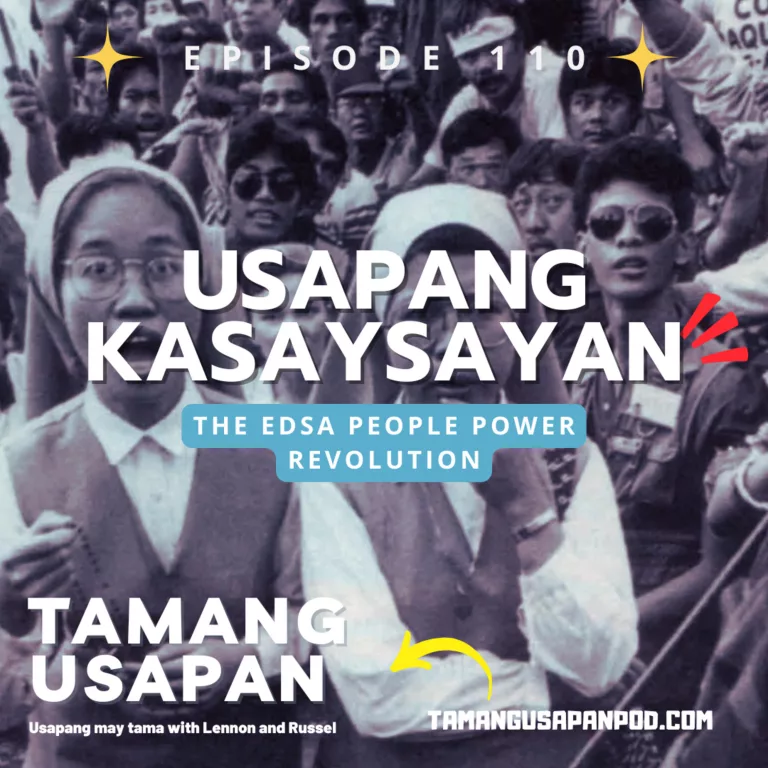“Integrity is achieved in death of an Existence at the same time as its existence” (Martin Heidegger).
On 10 September 2025, Charlie Kirk, an American conservative commentator and founder of Turning Point US, was assassinated in broad daylight at Utah Valley University. He was only 31 years old, three years older than I am as I write this, and he left behind a widow and two children. That an act of lethal violence occurred on the grounds of an academic institution—a place meant for debate and encounter—is devastating regardless of political persuasion. It wounds a world order that prides itself on reason and democratic values.
You might reasonably ask: “Father, why write about the death of an American political pundit? Your podcast isn’t political and you’re not even American. Why not write about the Flood Control corruption in the Philippines instead? That would be more useful to your audience.”
My answer: when Russel and I conceived Tamang Usapan – usapang may tama, we agreed our topics would range from philosophy to religion to social commentary. Thus, our show is categorized as Society & Culture. We don’t have a narrow niche (and yes, that’s one reason we’re not growing fast) but we continue because we want to think and speak, not merely chase algorithmic dopamine. Politics is a part of “Society & Culture.” And, politics is just a specific part of “Society and Culture”. So, let me, in this short piece, go down from our generalities to the specificity of the political.
Second, the issue at hand may concern American political reality. It may seem like a reality that will not affect us. It may only appear to distract us from the issues plaguing our country. However, that is not true. What happened in Utah and the reactions from people, some we even admire as bastions of democracy, reveals to us the precarious state of the world we live in. And also, I’m planning a commentary on the Flood Control issue in the Philippines so subscribe to our newsletter if you want that in your inbox.
With that out of the way, let us start.
The toga versus the arms
Cicero famously wrote, “Cedant arma togae” (“Let arms yield to the toga”). In other words, military or physical force must yield to civil authority; reason should prevail over violence. This dictum undergirds modern democratic society.
The post-Cold War democratic order, led in large part by the United States, rejects totalitarianism and claims to be governed by laws, logic, and debate rather than by force and fear. A university, above all, should be the seedbed of open discourse, being an epistemic community where future generations learn to meet the other with reason.
That arms once again triumphed over the toga and that it happened while Mr. Kirk was engaging students in debate is a stain on the liberal democratic ideal, the Neo-liberal order that Fukuyama thought was the best and thus the “end of history”. That he was silenced by a bullet and not by argument proves nothing about his ideas; it reveals, instead, how fear and contempt for disagreement can metastasize into violence.
The paradox of tolerance
Karl Popper’s “Paradox of Tolerance” says that a tolerant society must be intolerant of intolerance. Some of Mr. Kirk’s detractors appealed to this logic after his death; worse, some celebrated or excused the crime. Disturbingly, some of those voices come from people who call themselves “defenders of democracy”.
Take for example, a pundit (sometimes they like to cosplay as journalists) in a mainstream news channel in the US, who when the shooting was first reported, theorized that it could just be one of Mr. Kirk’s supporters firing a gun in celebration. When it was proven wrong, no one gave an apology. Some commentators even began finding fault with the victim, noting that he was a defender of “gun rights”. So, implicitly, he was, as we say in Tagalog, “naluto sa sariling mantika” (cooked in the very fire that he contributed to).
In the US House of Representatives, one of the congressmen asked for a time of silence when the news broke out (his death is yet to be confirmed). But, some liberal representatives can be heard shouting, “This is all your fault”.
In the Philippines, a famous leftist commentator made a statement in a Facebook post. He said that before, it was reformers like Martin Luther King Jr. who were assassinated. Today, the victims are “Christian ultranationalists.” And what is happening is a testament to the fact that the people “are beginning to hate fascist Christian nationalists”.
Blaming or rejoicing in violence because one dislikes a person’s politics is both vile and anti-democratic. This reveals a conscience no longer attached to the basic idea of the sacredness of human life. What matters is ideology.
Arguments not bullets
If you truly believe an opponent’s ideas are intolerant or dangerous, the remedy is argument and persuasion. Violence is the opposite of tolerance; it dehumanizes the other and perverts the democratic process. Moreover, killing a person can create a martyr and deepen divisions.
At the same time, it’s unfair and unhelpful when commentators on the other side blanketly accuse all of those who think differently from Mr. Kirk of complicity to the crime. Certainly there are some of those: famously and allegedly, the newly-elected President of the Oxford Union who had even debated Mr. Kirk once posted on his Instagram: “LOL”. But, there are still people across the spectrum who retain their humanity and see a murder not as a victory of their ideology but as a symptom of a broken democratic society.
What this means for non-Americans and what we should do
Whatever you think of Charlie Kirk’s ideas (I agree with him on some points and disagree on others), his method of engaging directly with opponents is the ideal political practice in a healthy democracy. If we want to safeguard democratic life in the Philippines or elsewhere, we should emulate that practice: seek dialogue, don’t fear debate.
To debate the other’s idea is not to offend him but to meet him where he is and listen to him so as the two of you can reach a consensus if possible, if not then at least the both of you are aware that the other is a human person with a Face and not just a caricature that most ideologies tend to create to present to us the other.
Beware echo chambers. They are just kitsch culture, as Milan Kundera would say. They confirm surface beliefs without depth. This produces complacency and hatred of difference. You think you are right. By reading and listening to people with the same idea, you congratulate yourself. You believe this to be a confirmation that you are right. You view the rest of the world, who think otherwise, as a monster.
Worse still, when we convert our academic institutions into echo chambers of ideological indoctrination and not an epistemic place of debate and encounter with the Other.
So go out and listen. Debate with charity and rigor. If someone truly preaches intolerance, meet their intolerance with reasoned intolerance—with logic, evidence, and moral clarity—not with bullets. Violence never solves the problem; it only deepens wounds and risks sacrificial hero-making for extremes on either side.
My last cents in this topic
Violence on a university campus is an assault on the principle that reasoned discourse can govern public life. We must defend the space for argument and the sanctity of human life, even, and especially, when we disagree.
Discover more from Tamang Usapan Podcast
Subscribe to get the latest posts sent to your email.





